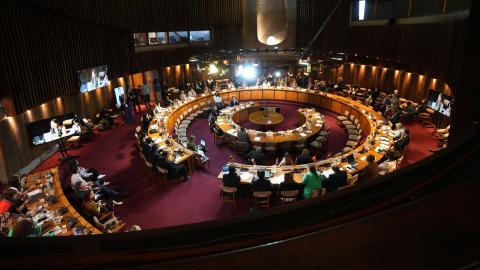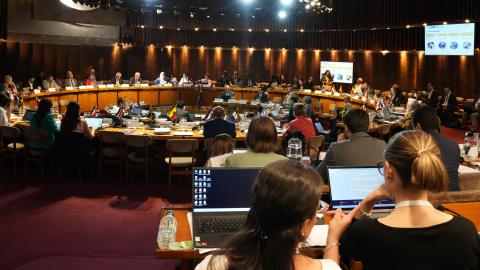Press Release
The Economic Commission for Latin America and the Caribbean (ECLAC) today reiterated its commitment towards supporting the mainstreaming of gender equality in the implementation of the 2030 Agenda for Sustainable Development in the region, at a workshop held at its headquarters in Santiago, Chile, during the commemoration of International Women’s Day.
“Placing gender equality at the centre of sustainable development represents a leap forward for civilization,” said the Executive Secretary of ECLAC, Alicia Bárcena, at the event’s inauguration. She went on to say that with this exercise the organization was joining in with the mobilizations and strike action being taken by women in dozens of countries under the slogan “solidarity is our weapon”.
“Women’s rights are human rights,” the head of the regional organization declared, quoting United Nations Secretary-General António Guterres. “However, in these difficult times, as our world becomes increasingly unpredictable and chaotic, the rights of women and girls are being reduced, curtailed and revoked,” she added.
Alicia Bárcena said that women were demanding an end to violence, discrimination, the excessive burden of unpaid work and gender bias in social protection, as well as progress toward an active role in decision making. “Equality of rights is a prerequisite for true democracy,” she stressed.
The quest for gender equality and the empowerment of women and girls is enshrined in the fifth Sustainable Development Goal (SDG 5), although the introduction to the 2030 Agenda, adopted by the international community in 2015, acknowledges that “the systematic mainstreaming of a gender perspective in the implementation of the Agenda is crucial” in meeting all 17 of its Goals.
Thus, as the head of ECLAC pointed out, progress with the rights of women will also help achieve the other SDGs. For that reason, the organization is working alongside the region’s countries to incorporate the gender perspective into national plans and budgets, into the capacity to generate statistics and the results thereof and into the discussion about the implementation and funding of the 2030 Agenda.
The 40-year history of the World Conferences on Women, organized by ECLAC, has left a legacy of both substance and form. In that regard, Alicia Bárcena noted that the Montevideo Strategy for Implementation of the Regional Gender Agenda within the Sustainable Development Framework by 2030, agreed on by the region’s governments last October, provides a road map for overcoming shortcomings in implementation and for attaining sustainable development through gender equality and women’s autonomy and rights.
The workshop’s inaugural session also heard remarks from Raúl García-Buchaca, the ECLAC Deputy Executive Secretary for Management and Programme Analysis, and María Nieves Rico, Director of the ECLAC Gender Affairs Division.
García-Buchaca described the steps taken by ECLAC to incorporate a gender perspective into all its initiatives, such as the adoption of guidelines to place a gender-aware focus at the centre of the updating and evaluation of its plans, projects and programmes, and the disaggregation of statistics to quantify the impact of those plans and raise their profile in promoting equality between men and women.
In turn, María Nieves Rico explained that the 2030 Agenda and the Montevideo Strategy were mutually reinforcing. At the same time, she warned of the risk of attaining certain goals to the detriment of others and, in particular, at the cost of women’s rights. Consequently, she called for a multidimensional perspective to be maintained and for focus to be placed on positive synergies.
After the meeting was opened, a discussion was held on the challenges for gender equality in implementing the 2030 Agenda according to the priorities of the different divisions of ECLAC. The speakers included the Deputy Executive Secretary, Antonio Prado, and the Officer-in-Charge of the Secretariat of the Commission, Luis F. Yáñez, together with the directors of the Commission’s different working areas and its subregional headquarters and national offices.


